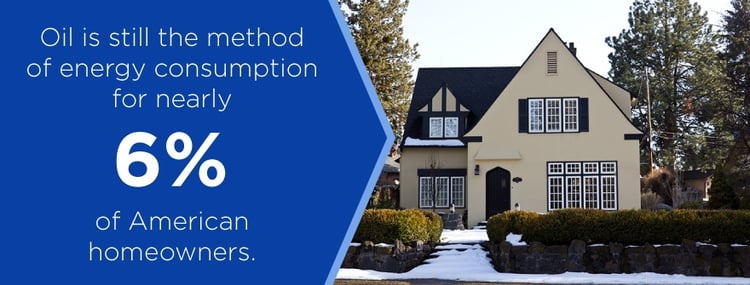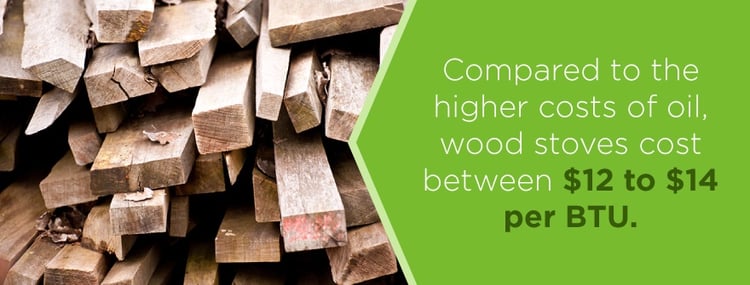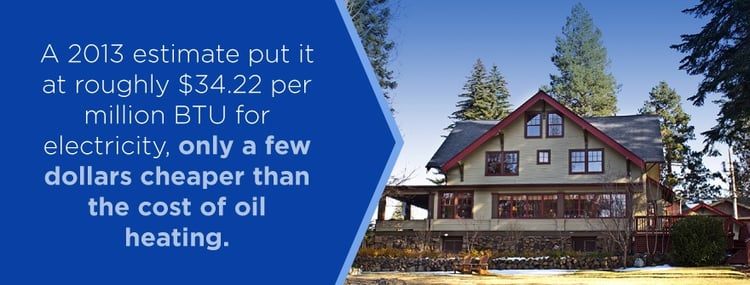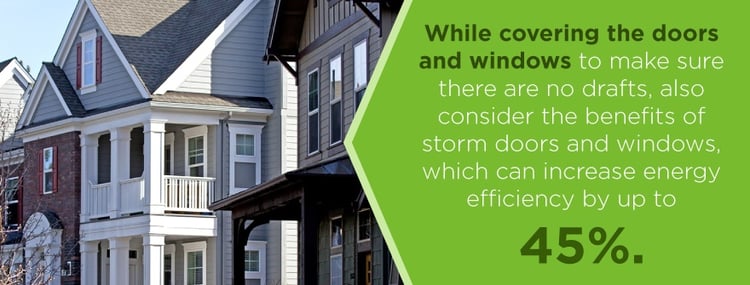
For homeowners across the country, heating expenses climb as the mercury drops with the return of wintry weather. Seasonal heating expenses are largely dependent on the climate you live, the structural design of the building, your heating system's operating efficiency and what method of energy you choose to generate heat.
Combating winter's icy grip with petroleum-based fuels like heating oil could be causing you to spend more than other forms of energy. Despite the increased expense of heating oil, and fluctuating oil prices around the world, oil is still the method of energy consumption for nearly 6 percent of American homeowners, according to the US Department of Energy.
While natural gas and electrical heating systems are the most common in homes, there are many alternative energy sources available. Supplementing with these alternatives can keep your home warm in the winter without spending excessive amounts on energy expenses.

While oil prices have dipped and soared in previous years, 2011 estimates based on EIA data place a comparative estimate that the average homeowner will spend nearly $2,535 on oil heat annually over $732 with natural gas.
Many of the homes in the country that still utilize oil for heat are located in the Northeastern U.S., an area known for harsh winters and cold weather. In that region, many historic homes still have their original oil-based heating systems.
With many alternatives available, supplementing heating oil in a home may not be as hard as you think. Heating systems often require annual maintenance for operating efficiency, but other methods of winterizing your home can help you save on heating expenses.

Take a look at the following methods of reducing energy expenditures (including alternative heating sources), methods of increasing efficiency and providing better insulation in the home.
How to Supplement Oil Heat
With increased energy expenses, many may wonder how they can shake the costs of heating oil and still keep their homes cozy and warm in the winter. Depending on where you live, your heating costs may vary.
A good way to determine if a different fuel is a feasible alternative is by understanding the amount of heat output you get in British Thermal Units, or BTUs. You can figure this out by researching the amount of fuel needed and calculating the total energy cost per gallons of fuel to generate that number of BTUs per hour, or BTUH. Other units, like those for electricity, are be calculated through kilowatts per hour.
Many of the methods discussed in this guide are recommendations from the U.S. Department of Energy, and can help you save on energy expenses year round, but some may not be suitable to everyone.
Supplementing Oil Heat with Active Solar Heating
The light of Earth's closest star is constantly irradiating down on the planet's surface each day, creating the warm, temperate conditions that have allowed life to flourish here for eons. Harnessing this starlight to heat the home is one of the most economical and efficient methods to supplementing your heating oil costs. Sunlight is a free resource that one should not waste.
The use of active solar heating systems allows solar energy to naturally heat a fluid, either liquid or air, and then convert that heat into useable warmth for your living space. It can even store it for use later, long after the warm rays have set beneath the horizon. Solar panels double as backup systems and as additional heat when needed, but all are well suited for homes that have boilers and radiators already installed. In addition, those with forced air systems already installed in their homes can include either liquid or air solar systems as well.
Depending on your climate and location, solar panels may or not be the best choice for you. Those who stand to benefit most from solar heating systems should live in an area with a cold climate, but have a steady supply of sunlight during the day to maximize performance. By offsetting much of the daily energy expenses, solar panels can reduce the amount of money needed for heating fuels like propane, natural gas and oil, as well as electricity usage. In addition, some states offer tax incentives, exemptions, credits and deductions for those who opt for solar panels due to the green energy advantages.
Longevity is also an advantage to owning a solar heating system, as many are designed to last for several decades, and can withstand the outdoor elements.
Supplementing Oil Heating with Wood and Wood Pellets
Sitting by the glow of a crackling fire on a cold winter evening has provided warmth to humanity dating back to the earliest forms of civilization. Even though humanity has improved technological advancements throughout history, one of the best forms of thermal energy comes from the combustion of wood and wood pellets.

Utilizing wood and wood pellets in your home can also drastically reduce your heating costs, as they are inexpensive and efficient alternatives to heating oil. Compared to the higher costs of oil, wood stoves cost between $12 to $14 per BTU, based on a 2013 estimate. While the cost is significantly lower and even acting a supplement, you should take some considerations before purchasing a wood burning stove for your home.
Wood burning is not a clean method of heating, and does generate many emissions in the form of smoke, which need to be properly vented from the home. For those who own fireplaces, wood is already a common household heat source in the winter months, but through advancements, modern wood burning stoves have become increasingly powerful, efficient and clean.
In order to maintain efficiency and not waste fuel, choosing the proper size of wood burner for your home is important. According to the department of energy, a good way to calculate the size of wood burner you will need is based on BTUs per square foot. A stove rated at 60,000 BTU should adequately heat a 2,000 square-foot home while a stove rated at 42,000 BTU lowers it to around 1,300 square feet. By ensuring the unit is not oversized, you will prevent overheating, as well as ensuring that it provides sufficient heating to lower your energy expenses.
In the case of wood burners and fireplaces, the location in the home is also essential in efficiency and safety. Depending on where you place the wood burner, the distribution of thermal energy will change. In the way space heaters are designed to radiate heat from a single point, wood burners and fireplaces act similarly. It is important to create an environment in which heat from the wood burner can circulate around the space.
While wood is a great supplement for oil, because of the number of air pollutants and emissions emitted during combustion, some municipalities and local laws may prohibit their use. It is important to understand the codes and regulations of your living situation before spending the cash on a wood burner.
Supplementing Oil Heating with Electricity
Electricity, like natural gas, is one of the most commonly used methods of heating homes in the United States. Because of this, electricity may be the most flexible in ways to supplement your heating oil expenses. Electric space heaters, baseboard heaters, water heaters, heat pumps, and furnaces are all appliances that can be used in place of oil.
Electricity can be created through wind, hydroelectric, fossil and nuclear power, making it one of the most versatile and readily available energy resources in the entire world. The most efficient use of electricity can be found in electric resistance heating, a 100 percent energy efficient method , as all electric energy is converted directly into heat. Unfortunately, most of the electricity produced comes from the combustion of coal, natural gas or oil, and only converts about 30 percent of the fuel's total energy into electric power, which leads to increased expenses.
However, despite the more expensive cost, there are still a number of ways that electricity can be used as a more affordable supplement to heating oil. Before investing money into an electrical heating appliance, consider the electric rates in your area, as distribution and infrastructure expenses can cause rates to vary across the country. A 2013 estimate put it at roughly $34.22 per million BTU for electricity, only a few dollars cheaper than the cost of oil heating.

If electric rates are lower in your area, consider the benefit of using electric space heaters. Space heaters are portable and offer the ability to heat a single space effectively, which can easily provide you with extra comfort and allow you to burn less oil in your heating system. Electric wall heaters and baseboard heaters for certain rooms may also be an advantage if you want to supplement your oil costs.
You should have wall heaters installed on interior walls, rather than exterior ones, because they tend to be more difficult to insulate. Baseboard heaters, on the other hand, are usually installed in rooms that can be controlled by a separate thermostat. By running electricity through heating elements encased in pipes surrounded by aluminum, heat will run along the baseboard of the room and rise upward as it warms.
For maximum efficiency, baseboard heaters are usually installed beneath windows. The rising heat will counter the cool air that falls from the window glass, and are usually installed on exterior walls where more heat loss occurs, unlike wall heaters.
Supplementing Oil Heating With Electric Heat Pumps
If you think electricity might be a feasible and cost effective alternative, consider the benefits of heat pumps, which are effective options in most climates and can help cut electricity usage by up to 50 percent.

In climates that have more moderate heating and cooling needs, heat pumps can be efficient alternatives to oil furnaces and air conditioners. With electricity, the heat pump pushes heat around the home to provide comfort. The pumps use the same process during the warmer months to push heat out of the home for better cooling. While heat pumps do not generate heat, they are effective in that they can collect heat from air, water or geothermal sources of energy. Because they do not need to rely on combustion or the consumption of fuel in order to provide warmth, they offer a supplement to oil heating.
The most common source of heat collected by heat pumps comes from air. High-efficiency pumps can also help dehumidify the indoor air and work more effectively than even some central air condition systems while offering less energy usage. Because of technological advancements, heat pumps have also become suitable for colder climates and offer heating alternatives to other types of furnaces and electric heating systems.
For systems that do not have ductwork or ventilation systems, mini-split systems are unique alternatives that can provide the same benefits as a traditional heat pump for homes equipped with radiant systems. Working similar to a regular heat pump, mini-split systems include an outdoor condenser and an indoor air control unit. Because of their smaller size and flexibility, mini-split systems can provide an alternative to heating single or multiple rooms with a single outdoor unit and multiple control systems installed throughout the residence.
In addition, because the system is ductless, installation is relatively easy and allows for less energy loss than central air systems, which often lose up to 30 percent of total energy consumption. Because of their design, mini-split systems are highly efficient and offer significant cost reductions when compared to oil heating. As with the other 2013 estimates, mini-splits will utilize $14.24 in electricity to generate 1 million BTUs of heat.
Supplementing Oil Heating Demands by Winterizing Home
While switching the main energy source you consume during the harsh winter months might help reduce your annual heating expenses, there are a variety of other methods that can help ensure you're utilizing whatever fuel you've purchased in an efficient way.

Hiring a professional energy auditor to inspect your home may seem like an unnecessary step to take, but auditors are trained to indentify gaps in your cooling and heating barricade, even if they don't seem apparent. Insulation is key to protecting your home from the elements, hot or cold, and inadequate insulation might not always be evident. A small draft of air coming through cracks in the windows or below exterior doors can waste 5 to 30 percent of your total energy usage. While covering the doors and windows to make sure there are no drafts, also consider the benefits of storm doors and windows, which can increase energy efficiency by up to 45 percent.
Another important step when preparing your home for winter is routine maintenance of your heating system. Similar to a vehicle, air filters and other components need to be replaced on a regular basis to maintain max efficiency. If your furnace is not efficient, you are wasting expensive oil and increasing the energy demand to heat your home. Providing an annual tune up to the furnace can prevent unneeded maintenance in the future, increase the longevity of your heating system, and prevent you from consuming more fuel the needed.

Newer thermostats, which are programmable, can also prevent you from consuming energy when it’s not needed. For every degree you lower the thermostat, you could see a 1 to 3 percent difference on your heating bill. For those interesting in monitoring their exact energy consumption, meters are available that provide extensive data for tracking household electricity usage. By monitoring where and when electricity is being used and wasted, you can help cut the electric bill significantly.
Another elusive problem is heat escaping from your ventilation system at points where it’s not needed. Older ductwork may be full of gaps, thus allowing precious heat to escape. As in the case with your furnace, a tune up of your duct work can help maintain efficient and prevent waste. Hiring a professional HVAC technician to inspect and repair aging ductwork can help you save up to 10 percent of the heat that would otherwise escape. In addition, ductwork that has been installed properly can help prevent air quality problems like mold and dust.
Another elusive loss of heat may be coming from the pipes in your home transporting hot water to different areas of the house. As with walls and other parts of the home, adding insulation can be a cost effective way of reducing energy expenses and ensuring the heat stays where it is intended. It is important to assess the climate you live, the energy rates near you, and the structural design and heating demands of your home to better decide which steps are the best option for you.

Whether it be through the utilization of space heaters or an alternative fuel source, you can ensure energy savings without sacrificing comfort and warmth during the coldest months of the year. By taking a few simple steps to increase energy efficiency around your home and by using alternative heat sources when able, you can create a significant savings each year.
The Better Way to Buy Heating Oil
With pricing up to 40 cents below the EIA’s average prices, Smart Touch Energy makes it easy to save money with heating oil. Our website and app makes it possible to manage your account, track deliveries and place orders 24 hours a day. We currently provide heating oil to customers in New Jersey, Connecticut, New York, Massachusetts, Rhode Island, Maine, New Hampshire and Pennsylvania.
With Smart Touch, you have the assurance of many years of experience in the fuel industry. All of the local dealers in our extensive network are fully evaluated to ensure quality results and trustworthy support.




